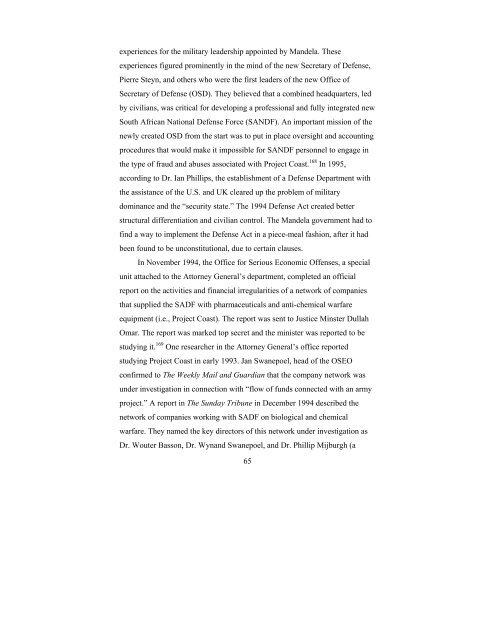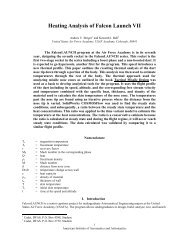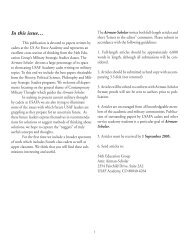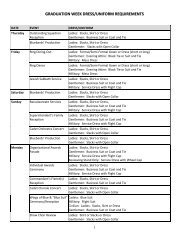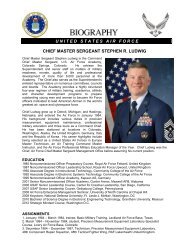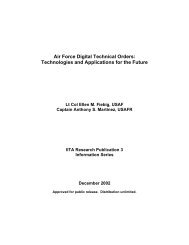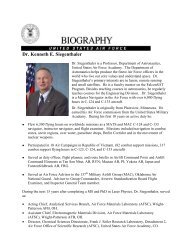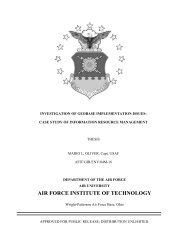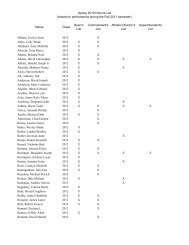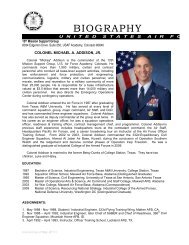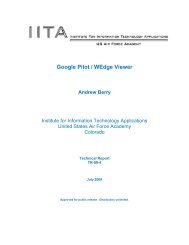the rollback of south africa's biological warfare program
the rollback of south africa's biological warfare program
the rollback of south africa's biological warfare program
You also want an ePaper? Increase the reach of your titles
YUMPU automatically turns print PDFs into web optimized ePapers that Google loves.
experiences for <strong>the</strong> military leadership appointed by Mandela. These<br />
experiences figured prominently in <strong>the</strong> mind <strong>of</strong> <strong>the</strong> new Secretary <strong>of</strong> Defense,<br />
Pierre Steyn, and o<strong>the</strong>rs who were <strong>the</strong> first leaders <strong>of</strong> <strong>the</strong> new Office <strong>of</strong><br />
Secretary <strong>of</strong> Defense (OSD). They believed that a combined headquarters, led<br />
by civilians, was critical for developing a pr<strong>of</strong>essional and fully integrated new<br />
South African National Defense Force (SANDF). An important mission <strong>of</strong> <strong>the</strong><br />
newly created OSD from <strong>the</strong> start was to put in place oversight and accounting<br />
procedures that would make it impossible for SANDF personnel to engage in<br />
<strong>the</strong> type <strong>of</strong> fraud and abuses associated with Project Coast. 168 In 1995,<br />
according to Dr. Ian Phillips, <strong>the</strong> establishment <strong>of</strong> a Defense Department with<br />
<strong>the</strong> assistance <strong>of</strong> <strong>the</strong> U.S. and UK cleared up <strong>the</strong> problem <strong>of</strong> military<br />
dominance and <strong>the</strong> “security state.” The 1994 Defense Act created better<br />
structural differentiation and civilian control. The Mandela government had to<br />
find a way to implement <strong>the</strong> Defense Act in a piece-meal fashion, after it had<br />
been found to be unconstitutional, due to certain clauses.<br />
In November 1994, <strong>the</strong> Office for Serious Economic Offenses, a special<br />
unit attached to <strong>the</strong> Attorney General’s department, completed an <strong>of</strong>ficial<br />
report on <strong>the</strong> activities and financial irregularities <strong>of</strong> a network <strong>of</strong> companies<br />
that supplied <strong>the</strong> SADF with pharmaceuticals and anti-chemical <strong>warfare</strong><br />
equipment (i.e., Project Coast). The report was sent to Justice Minster Dullah<br />
Omar. The report was marked top secret and <strong>the</strong> minister was reported to be<br />
studying it. 169 One researcher in <strong>the</strong> Attorney General’s <strong>of</strong>fice reported<br />
studying Project Coast in early 1993. Jan Swanepoel, head <strong>of</strong> <strong>the</strong> OSEO<br />
confirmed to The Weekly Mail and Guardian that <strong>the</strong> company network was<br />
under investigation in connection with “flow <strong>of</strong> funds connected with an army<br />
project.” A report in The Sunday Tribune in December 1994 described <strong>the</strong><br />
network <strong>of</strong> companies working with SADF on <strong>biological</strong> and chemical<br />
<strong>warfare</strong>. They named <strong>the</strong> key directors <strong>of</strong> this network under investigation as<br />
Dr. Wouter Basson, Dr. Wynand Swanepoel, and Dr. Phillip Mijburgh (a<br />
65


